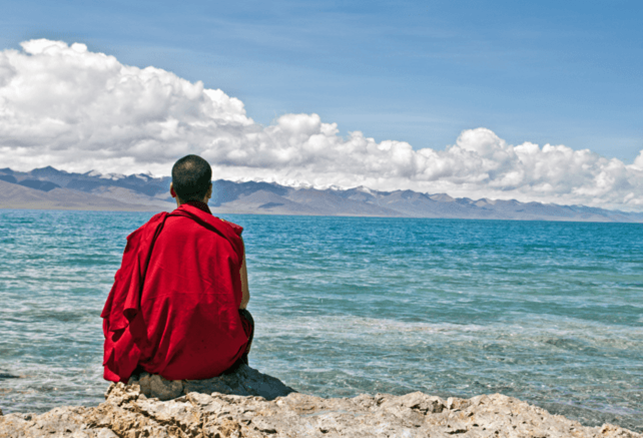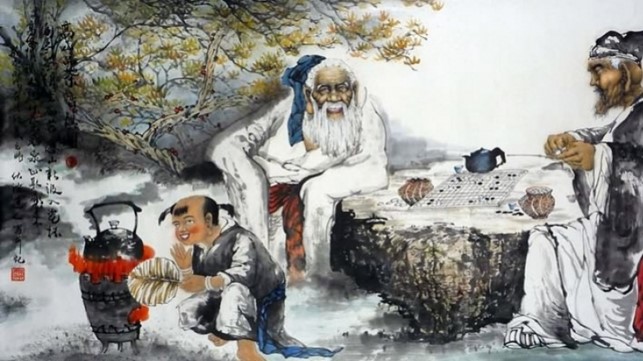Many people drink tea in a careless manner. To understand this just look around you. Look at how people drink tea.
What is tea in everyday life?
Office, computer, mug, tea bag. Or, for example, after a snack with cookies and vanilla wafers. Or in the evening, in the kitchen, along with toast. It’s neither good nor bad. It just happens. It’s sort of a European tradition of tea consumption, in addition to the traditional English 5 o’clock tea.
Everything is different with loose tea. I will try to explain. The time devoted by the Chinese to tea is a separate ceremony. Separated from everything. From food, from work, from everyday life and constant thoughts. Something independent and autonomous. It is an action of its own.
First of all, Chinese tea infusion should never be accompanied by food. The latter spoils the taste of tea, that’s exactly why tea ceremony was created hundreds of years ago. I cannot imagine putting together a light Sheng Puer and a sandwich. Or for example white tea with chocolate. It cannot be good.
What’s more, these types of teas cannot be mixed. No milk, no lemon, no sugar. You can try it for yourself. In fact, I insist, you really should see for yourself. I’m sure it will be a singular experiment.
The most important difference however is in the tea ceremony. One might think that the expression “tea ceremony” means seriousness, but in reality there is nothing complicated about it. Everyone can perform the tea ceremony at their own home. It is just a way to steep tea in miniature vessels. If you don’t know how to do it, ask friends who are already tea enthusiasts. They will explain it to you. Or ask me or read our article. Or use Google. You’ll be surprised to find out how simple it can be.
In addition, with Chinese tea we get a good dose of alkaloids. Alkaloids – the substances that, in our bodies, turn life into something beautiful. These alkaloids are in coffee, cocoa and chocolate. It is thanks to them that these drinks have become famous all over the world. (But not because of their taste, as it might seem at first glance). Tea alkaloids have a slow awakening effect on the body. They improve mood, vitality and concentration. But they do so tactfully and gently. As opposed to coffee. Much more gently and deeply. Tea was the best solution to the problems associated with meditation practices in the monastic environment. For this reason, monks were the first proponents of tea culture.
So, after the tea ceremony, we return to the world rested, lightened, emotionally charged even on a biochemical level. The reality around us appears with different colors. Problems become solvable. And within us we will preserve for longer a sense of calm and stability.
Chinese tea is not just tea. Not just flavor. Not just taste. It is also a form of meditation. The tool to relax and break time. I’ll leave it up to you to choose to use it or not, but I want you to know that this option exists.
Stop thinking it’s hard! It is very easy!
On the surface, the tea ceremony is just a practice for brewing tea, but handling small cups will help you focus only on what you’re doing. On the tips of your fingers. Focus on each movement without rushing. Our brains don’t support multitasking. We can’t do two things at once. If we consciously focus on the process of making tea, we can block out the ghost of problems and thoughts we have. It happens on its own. Even without effort.
It’s just a way to totally free yourself from worry.
When we cyclically repeat simple movements, when we focus on our fingers, on olfactory and tactile sensations, on decanting water, we end up in a light, comfortable and controlled trance.
I hope you understand the word “trance” correctly. It is the feeling we get when we look at a beautiful sunset or the snowy peak of a five thousand foot mountain, or the fireplace fire on a cold evening. We often go into a light trance, but we don’t often notice it. They are beautiful and very helpful to our psychological well-being.
During the tea ceremony, this pleasant and familiar condition comes with particular ease. And it will be great to have a person with you to share the experience. In this way it could become a synergy repeated multiple times. I’m not talking about inventions. These things happen for real. You will notice them easily, you just need to be able to feel them.

In addition, with Chinese tea we get a good dose of alkaloids. Alkaloids – the substances that, in our bodies, turn life into something beautiful. These alkaloids are in coffee, cocoa and chocolate. It is thanks to them that these drinks have become famous all over the world. (But not because of their taste, as it might seem at first glance). Tea alkaloids have a slow awakening effect on the body. They improve mood, vitality and concentration. But they do so tactfully and gently. As opposed to coffee. Much more gently and deeply. Tea was the best solution to the problems associated with meditation practices in the monastic environment. For this reason, monks were the first proponents of tea culture.
So, after the tea ceremony, we return to the world rested, lightened, emotionally charged even on a biochemical level. The reality around us appears with different colors. Problems become solvable. And within us we will preserve for longer a sense of calm and stability.
Chinese tea is not just tea. Not just flavor. Not just taste. It is also a form of meditation. The tool to relax and break time. I’ll leave it up to you to choose to use it or not, but I want you to know that this option exists.
Stop thinking it’s hard! It is very easy!



